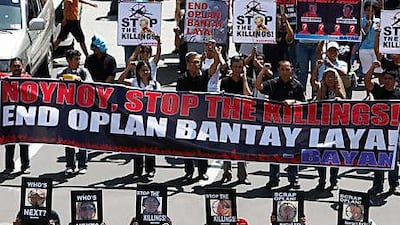MANILA // The recent spate of killings of left-wing activists and journalists in the Philippines is being seen by many as a test of the country's new president, Benigno Aquino, who was the target of a murder attempt in 1987 when his mother was president. Among the activists were leaders of unions and peasant groups.
In June, three journalists and a main witness to November's Maguindanao massacre, in which 57 people were murdered, were killed in the Philippines. Since Mr Aquino's inauguration on June 30, another journalist, four leftist activists and the cousin of one of them have been killed. At the same time, a former lawyer of a witness to the massacre and a journalist have survived separate murder attempts.
Last week, the New York-based Human Rights Watch (HRW) called on Mr Aquino to end the killing of political activists and journalists. In a letter delivered to the president on Tuesday, the rights group urged Mr Aquino to move swiftly with clear and effective policies to carry out his campaign promises to promote justice, end extrajudicial killings and abolish private armies. "The Philippines faces daunting human rights challenges," Elaine Pearson, HRW's acting Asia director, wrote. She urged the president to turn his "promises into action by taking immediate steps to end the widespread killings and hold the killers and those who deploy them accountable". The country's interior secretary, Jesse Robredo, told the Philippine Daily Inquirer in comments published on Saturday that the attacks on activists and journalists were a major challenge not only to the president but the government as a whole.
He said the government was not interested in setting up "more task forces" to investigate the killings. "Our interest is more in the institutional and not just the piecemeal response. If a killing happens, automatically there should be a corresponding action instead of forming a task force," he said. Detlev Mehlis, who heads the EU Philippine Justice Support Programme in Manila, said recently in an interview with The National that the problem was the criminal justice system. "It just isn't working. It needs to be thoroughly overhauled. Cases drag on for years, witnesses are killed, die or simply disappear. There has to be a reason why only 10 per cent of all murder cases are ever solved in this country."
Mr Mehlis, a senior public prosecutor with the German attorney general's office in Berlin, was appointed by Kofi Annan, then UN secretary general, to head the organisation's International Independent Investigation Commission into the assassination of Rafik Hariri, a former Lebanese prime minister. The EU Philippine Justice Support Programme was established in 2007 by Gloria Macapagal Arroyo, Mr Aquino's immediate predecessor, at the height of extrajudicial killings. It was designed to help the country's judiciary, police and military establish a national mechanism to monitor the killings.
Out of hundreds of extrajudicial killings and enforced disappearances since 2001, there have been only six successfully prosecuted cases, resulting in the conviction of 11 defendants. None of those convicted has been an active member of the military, despite considerable evidence of military involvement in such crimes, Human Rights Watch said. Mark Francisco, a teachers' union activist, was killed in the central Philippine province of Masbate on July 9, while he was travelling home with friends. On July 10, Pascual Guevarra, head of the Agrarian Reform Beneficiaries Association, was killed when gunmen burst into his home in Laur on the main island of Luzon.
The congressman Antonio Tinio of the Alliance of Concerned Teachers said that he condemned the killing of Francisco, who campaigned for him during the election. "However you look at it, most of these killings are politically motivated - whether union activists or journalists," he said. Rafael Mariano, a left-wing congressman, said in a statement last week that the "rash of killing of activists is a continuing policy of the military".
The military denied the claim, saying there is no policy by the military to killing activists in the country. Mr Mariano said the recent killings took place in areas well known as "military priority areas" in its campaign against the Left. Two years ago, Philip Alston, the special rapporteur of the United Nations Human Rights Council on extrajudicial, summary or arbitrary executions, said the Philippine military "is in denial about the killings and the involvement of soldiers and agents in most of these [extrajudicial killings] cases".
On July 12, Mr Aquino, after meeting the country's senior military officers, told reporters that the killing of activists "was not the policy of the state". "Many of these killings are due to personal feuds," he said. kwilson@thenational.ae

